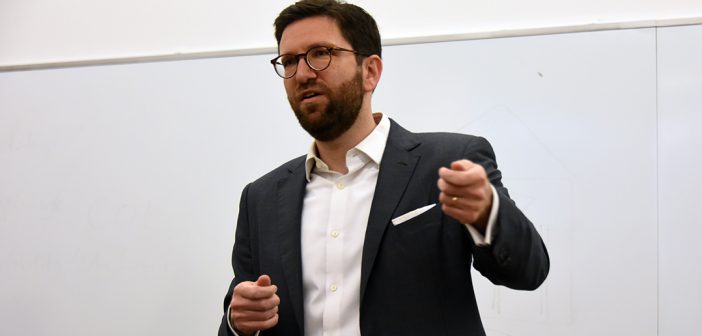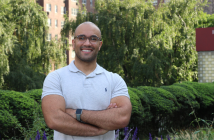Author and lawyer Joseph Tartakovsky ’11 returned to his law school alma mater on April 10 for an invigorating presentation on his debut book, The Lives of the Constitution: Ten Exceptional Minds That Shaped America’s Supreme Law.
During the 90-minute program, Tartakovsky detailed how he chose the book’s key figures, what makes America unique among history’s other democracies, and why, even in today’s divisive political landscape, our constitutional disagreements remain a vital part of our democracy. Tartakovsky provided a brief introduction to his book before conversing with Professor Andrew Kent, who hailed the author as his greatest constitutional law student in his decade-long Fordham Law teaching career.
Earlier this month, Tartakovsky left his position as deputy solicitor general of Nevada to devote more time and energy to his writing career. The James Wilson Fellow in Constitutional Law at the Claremont Institute and an editor at the Claremont Review of Books, Tartakovsky embarked on his inaugural book project to satisfy his own curiosities about how the United States arrived upon its third century under its Constitution—an unprecedented feat that no other nation has achieved.
“Most countries have text, but what makes us unique, I’ve found, is our constitutional culture, without which text would be meaningless,” said Tartakovsky, who explained that our assumptions, traditions, and loyalties make all the difference, when comparing the United States to other democracies.
“The text is extraordinary,” he continued. “It mostly remains the same outside of the amendments, but our applications outside the Constitution’s text, and our interpretations of it, have changed constantly.”
The Lives of the Constitution is framed via the stories of 10 people who helped make the Constitution what it is today. The book features renowned figures in American history, such as Alexander Hamilton and Woodrow Wilson, and less well known, such as Ida B. Wells-Barnett and James Wilson. Fewer than half the chapters center around Supreme Court justices—an intentional decision, according to Tartakovsky.
“I don’t think the story of our Constitution can be told merely as a series of court decisions,” he shared. “The story of the Constitution is the story of the American people. You need to have everything in there: culture, technology, our wars.”
This century’s battle over marriage equality exemplified Americans’ continued willingness to think hard about their Constitution, Tartakovsky noted. The changing views of Americans resulted in numerous states democratically enacting laws that legalized marriage equality before the U.S. Supreme Court’s Obergefell v. Hodges ruling made it the law of the land.
“Why does Justice Anthony Kennedy get credit for this?” asked Tartakovsky, referencing Kennedy’s decisive swing vote in the Supreme Court’s 5-4 ruling. “He didn’t do it. He just confirmed what other Americans had done.”
Three years after that landmark ruling, we live in a time of “constitutional anxiety,” Tartakovsky conceded, but he quickly added that America has always had a “constitutional hypochondria, and that’s a good thing.” He cited a letter Hamilton wrote to Gouverneur Morris in 1802 wondering why he wasted so much of his life propping up a “frail and worthless” Constitution.
More than two centuries after Hamilton’s ruminations, America has “the greatest body of practice and the greatest record” of how democracy is maintained, said Tartakovsky, observing our experience can be instructive to other countries as they craft their own constitutions.
“Maybe this fretting, this clashing, this debate, and this concern over the Constitution is what keeps us going in the end,” Tartakovsky proposed, identifying America’s mix of idealism and realism, innovation and conservatism, and pragmatism and courage as keys to its ongoing democratic experiment.
The Fordham Law chapters of the Federalist Society and American Constitution Society cosponsored the event.
Story and photos by Ray Legendre.





